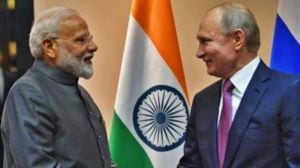Stay updated with the latest - Click here to follow us on Instagram
Ashoka the Greek, and other Stories
An eccentric, endearing history of the foreign view of India
A Strange Kind of Paradise: India Through Foreign Eyes
Sam Miller
Penguin
427 pages, Rs 599
There is not a text Sam Miller will not annotate, not a factoid he won’t chase down, not a site of the foreigner’s encounter with India that he will not visit, and not a footnote he will shirk from, to convince yet more the already convinced that each of our private worlds can be a wonderful starting point for a rich intellectual inquiry. Putting his life story at the heart of an encyclopaedic history of India by examining the foreigner’s depiction through the ages could easily have become a tiresome, or, at the least, irritating conceit. It does not.
In fact, Miller, resident of India for more than 10 years and visitor to the country for more than 25, so artfully designs his narrative “to understand how the Greeks, the Romans, the Chinese, the Arabs, Africans, Europeans and Americans – everyone really, except for Indians themselves, came to construct their ideas of India”, that it’s difficult to determine whether this is primarily a personal memoir or a work of history. Whether his life story is attendant to the larger research, or whether the intellectual inquiry into the forming (shedding) of foreigners’ fantastical assumptions about India is a necessary exercise in determining his place in an adopted home.
It started with a wedding. Miller first came to Bombay as the brother of a bride, and, as it turns out, the boyfriend of the Indian groom’s sister. (They subsequently married, and he later reported for the BBC, and also wrote a book on Delhi.) Miller says, rather too glibly, that at the time he had decided that India “was not” for him. But his first day in India threw him in the company of his girlfriend’s stepfather, Tony Mango, long-time India hand and honorary Greek consul in Bombay. Mango had a deep interest in Greek visitors to India and their accounts, an interest Miller came to share and partner. This book grew out of a talk on Greek accounts he developed.
Starting with Megasthenes’ familiar account, through to Mango’s speculation that Ashoka may have had a Greek grandmother (“he should be called Ashoka the Greek”) and Alexander’s military excursions, and coming right up to the present day, it is a pacey and often hilarious overview of those who have, or may have, visited India and how India was depicted. The result — with directly as well as tangentially connected photographs, footnotes and directions to YouTube videos — has a multimedia depth, but the arc of the narrative points only in one direction. To understand how the visitors’ personal idea of India (and/or their temptation to force-fit observations in a grand theme) has contributed to stereotype, whether in the service of empire or racism or orientalism, or even self-delusion.
At Heliodorus’s pillar in Vidisha, the temptation comes full blast. As with so many other structures of antiquity, the pillar had over time become part of local folklore and was worshipped as a deity, Khambh Baba, till archaeologists finally scraped off accretions to reveal an inscription connecting it to an ambassador of Taxila’s Greek king 200 years after Alexander, expanding the map and deepening the timeline of Greek influence in the subcontinent. When Miller visits, an old woman tells him an electrifying story of a king called “Sikandar” who’d been transformed into the pillar, Miller’s thoughts race ahead of reason, and he fancies himself to be on the brink of establishing that this record of Greek influence in central India had been known locally long before archaeologists made their discovery.
Miller, too, is of his time, and he reaches back to early connections to Indian themes via popular culture (the Japanese TV series Monkey, evidently extremely popular in late 1970s Britain, and the cult of the Buddhist monk Tripitaka, better known to us as Hiuen Tsang, Richard Attenborough’s Gandhi, the Beatles) as well as to Edward Said. Combined with his flaneur’s manner, and set against the current culture wars in India, the larger story he offers is, therefore, as much a work of literary as political criticism.







